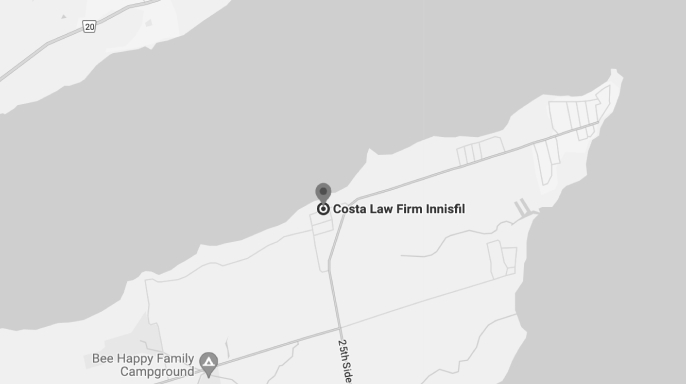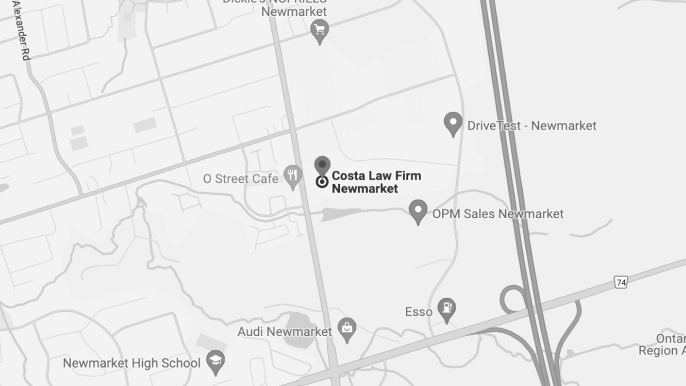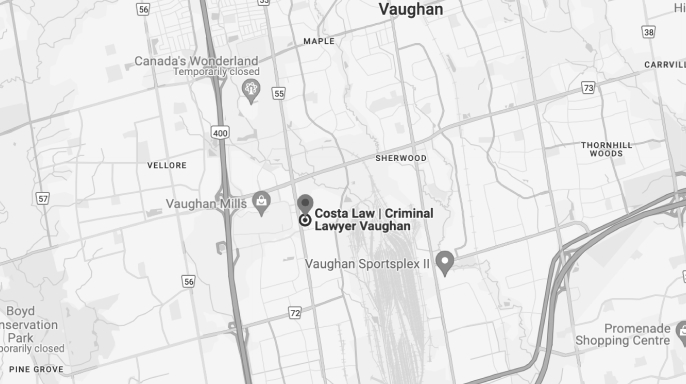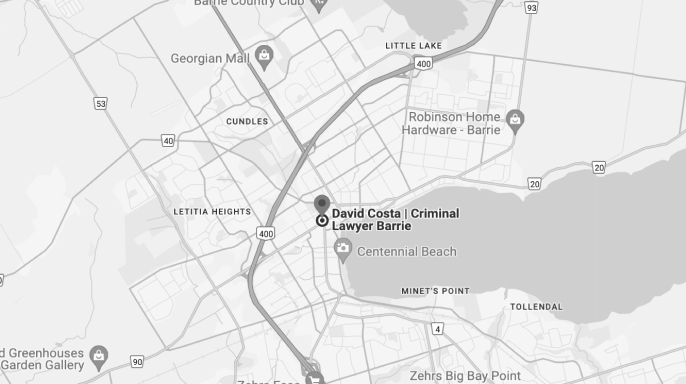Forcible Confinement Lawyer
Most people charged with domestic assault or sexual assault find themselves also accused of forcible confinement. It’s not uncommon for allegations of forcible confinement to be raised during your divorce or child custody disputes. This is because criminal allegations of this nature can work in favour of the complainant, particularly in family law proceedings.
Costa Law is a trusted and reliable criminal litigation law firm that’s dedicated to delivering personalized legal counsel and creating defence strategies that result in favourable outcomes. Our lawyers have many years of experience and have successfully defended hundreds of allegations related to forcible confinement in Ontario. Therefore, if you are facing such allegations, contact us. Having our lawyer represent you could mean the difference between a favourable outcome and a maximum penalty.

What’s Forcible Confinement?
Forcible confinement should not be confused with kidnapping. According to the Canadian Criminal Code, it occurs when the accused, without lawful authority, confines, imprisons or forcibly seizes a person. That means if you intentionally restrain or confine another person against their free will, you could be committing the offence of forcible confinement. This is an action that infringes upon the complainant’s liberty as it restricts their freedom of movement.
Canada’s Criminal Code shows that forcible confinement charges often arise in two common scenarios. These charges are often accompanied by other charges such as assault, breaking and entering, robbery, or theft. In the context of a romantic relationship, the accused person may have locked the alleged victim or held them in a bedroom or bathroom for some time due to a disagreement or fight.
In the context of commercial or residential robbery, the perpetrator(s) may have locked the employees or property owners in a room so that they can commit other offences, such as sexual assault and theft, undisturbed.

Establishing a Crime of Forcible Confinement
Anyone who commits forcible confinement is guilty of an offence punishable on summary of conviction or indictable offence and is liable to an imprisonment term of up to ten years. For the Crown prosecution to get a forcible confinement conviction, it must be proven beyond reasonable doubt that you (the accused) committed actus reus and mens rea linked to the crime.
The Guilty Act or Actus Reus
The Actus Reus, or the guilty act, requires the Crown to demonstrate beyond a reasonable doubt that the offence occurred. That means the accused confined, imprisoned, or forcibly seized another individual. “Confinement” entails restricting or limiting a person’s movement without necessitating physical restraint. This can involve keeping someone within specific boundaries or a defined area.
The period of confinement doesn’t need to be lengthy for it to be considered an indictable offence. Thus, instances which involve a significant period when the alleged victim is directed contrary to their wishes or coercively restrained may be considered forcible confinement. That means the complainant cannot move according to their inclination.
Sometimes, it’s possible for an arrest by a private citizen or a police officer to be considered unlawful confinement.
The Guilty Mind or Mens Rea
This requires the Crown to establish beyond a reasonable doubt that the accused intended to deprive another individual of their freedom of movement. Forcible confinement is categorized as a general intent offence. That means minimal intent to commit the act suffices. Intent is typically inferred from the commission of the act, implying that the accused intended the natural consequences of their actions.
Our legal team will carefully evaluate your case to identify any potential inconsistencies with the elements of forcible confinement as outlined by the law. We will scrutinize the evidence presented by the Crown to ensure that the Actus Reus, including confinement, imprisonment, or forcible seizure, is clearly established. Additionally, we will assess whether there is sufficient evidence to prove the Mens Rea, such as the intent to deprive the victim of their freedom of movement.
Further, our lawyers will conduct a thorough analysis of the circumstances surrounding the alleged criminal offence to determine if there are any mitigating factors or defences that could be utilized. This comprehensive approach allows us to provide the strongest possible defence for our clients and ensure their rights are protected throughout the legal process.
Defending Forcible Confinement Charges
Our legal team at Costa Law is dedicated to providing effective defence strategies for individuals accused of forcible confinement. With a proven track record of successful defence backed by years of experience, we are committed to protecting our clients’ rights and ensuring that they receive fair treatment under the law. Here are some of the defence options:
Mistaken Identity and Insufficient Evidence
In every forcible confinement case we handle, we conduct a detailed review of all evidence presented by the Crown, including witness statements, police reports, surveillance footage, and any other pertinent information. Our skilled lawyers approach each case with a keen eye to identifying any gaps, inconsistencies, or weaknesses in the prosecution’s case.
One key aspect of our defence strategy involves thoroughly examining whether the alleged victim can accurately identify our client as the perpetrator. We scrutinize witness testimonies and assess the reliability of identification evidence to challenge the prosecution’s claims. By successfully raising the identity defence, our lawyers can get your charges dropped based on flawed identification.
Belief in Lawful Authority
Our lawyers can raise this defence if you (the accused person) have reasonable grounds to believe that you had lawful authority to confine the complainant. This may be relevant in cases involving mistaken identity, where you believed that you were lawfully arresting a suspect.
Further, we investigate the case and determine whether you (our client) had a valid reason for confining or restraining the individual in question. We investigate factors such as the alleged victim’s behaviour at the time of the incident, including whether they were acting angrily or hysterically, which could have justified your actions out of concern for personal safety or the protection of property.
Self-Defence
Another potential defence strategy involves demonstrating that you acted in self-defence or in defence of others. Our lawyers will analyze the details of your case and determine if you had a rational belief that you were lawfully authorized to confine the individual, which could exonerate you from liability.
Lack of Intent
In cases where it is alleged that you assisted someone else in committing the offence of forcible confinement, we will assess whether you had knowledge of the other person’s intentions and whether you should be held accountable for those actions. That means you had no intention of confining the victim.
At Costa Law, we understand the gravity of forcible confinement charges and the potential consequences our clients face. That’s why we leverage our extensive legal competence and resources to mount a solid defence tailored to the unique circumstances of each case. Our unwavering commitment to protecting our clients’ rights ensures that they receive the best possible representation throughout the legal process.
Unlawful Confinement Penalties
According to Canada’s Criminal Code, forcible confinement is a hybrid offence. Thus, the prosecutor can proceed summarily or prosecute as an indictable offence depending on the facts and circumstances of the case. Here are the penalties associated with a forcible confinement conviction.
Note that forcible confinement is an indictable offence that’s liable to an imprisonment term of up to ten years under Canada’s criminal law. Unfortunately, it can be challenging to defend these allegations because there is rarely physical evidence or witnesses to refute or support the claim. Considering the severe penalties and the life-long consequences of a forcible confinement conviction, it’s in your best interest to hire an experienced lawyer if you are facing such charges.
Summary Conviction
S.279 (2) of Canada’s Criminal Code details a summary conviction for forcible confinement. Once the prosecutors choose to proceed with a summary conviction, you face up to 2 years less a day in jail. You may also face a fine of up to $5,000. Under summary conviction, the following dispositions may be available:
- Fine alone
- Fine and probation
- A fine, intermitted sentence, and probation
- Suspended sentence
- Intermitted sentence
- Prison and probation
Indictable Offence
Once you are convicted for forcible confinement, the Crown prosecutor may opt to proceed by indictment. That means you face up to ten years of imprisonment. Here are dispositions that may be available after being convicted for this indictable offence:
- Suspended sentence
- Fine
- Intermitted sentence
- Fine and probation
- Prison and probation
- A fine, intermitted sentence, and probation
It’s key to understand that the maximum penalty and the sentence set will be determined by various elements. These include the seriousness of the crime, the presence of aggravating factors, and the accused person’s criminal record. If forcible confinement involves aggravated factors like the use of a prohibited firearm and committing the crime to benefit a criminal organization, the penalty will be severe.
However, if the convicted person has no previous criminal record and demonstrates remorse, they may get the minimum punishment for their first offence of forcible confinement. Ultimately, the final resolution on the fitting penalty will be decided by the judge or jury. The court will look at all relevant circumstances involved before making a decision. These include whether this is the offender’s second or subsequent offence, whether the offender was earlier convicted, and more.
A conviction for forcible confinement can result in life-long consequences, such as acquiring a criminal record. This can affect your chances of getting employed and pose challenges when travelling internationally. The gravity of these consequences underscores the importance of strong legal representation to mitigate the impact of such charges. Our skilled lawyers can help navigate the complexities of cases involving forcible confinement and mount a strong defence to ensure you get the best possible outcome.
Request A Consultation
Testimonials
What our clients are saying
Contact Us
Costa Law Firm
Costa Law Firm is a law firm located in Toronto with exceptional credentials that stands out for its commitment to client service. Our service minded approach has led Costa Law Firm to be one of the most reliable law firms in Toronto.
Address
Main Office:
1015 Bloor Street West, Toronto, Ontario M6H 1M1
Phone: (416) 535-6329
Fax: 416-535-4735
info@costalawfirm.ca
We provide emergency services for urgent matters.
Consultation Office:
17075 Leslie St Unit 6, Newmarket, ON L3Y 8E1Vaughan location 290 Caldari Rd Unit 8, Concord, ON L4K 4J4, CanadaBarrie location 49 High St 3rd floor, Barrie, ON L4N 5J4, Canada











